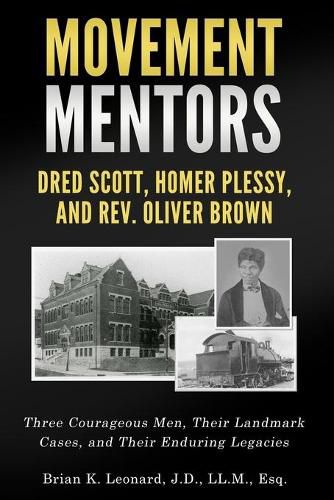Readings Newsletter
Become a Readings Member to make your shopping experience even easier.
Sign in or sign up for free!
You’re not far away from qualifying for FREE standard shipping within Australia
You’ve qualified for FREE standard shipping within Australia
The cart is loading…






This title is printed to order. This book may have been self-published. If so, we cannot guarantee the quality of the content. In the main most books will have gone through the editing process however some may not. We therefore suggest that you be aware of this before ordering this book. If in doubt check either the author or publisher’s details as we are unable to accept any returns unless they are faulty. Please contact us if you have any questions.
Movement Mentors presents three of the most important civil rights cases in the history of the U.S. for African Americans, Dred Scott v. Sandford, Plessy v. Ferguson, and Brown v. Board of Education of Topeka Kansas, through the lens of the men who brought them, the cases themselves, and the continuing legacies of each man and their case today and for the future. The book seeks to provide insight into these important legal battles that helped to shape the future of race relations and form the backbone of the journey of African Americans, from enslavement to freedom. It also provides tips from the experiences of these men and the cases for current and future civil rights activists to follow. Each one of these men’s cases came about during important movements, that became watershed moments in the struggle for equal civil rights for African Americans in the U.S. In the book, each man is first introduced to provide the background and the genesis story for his case. Then the case that made them famous is discussed. Following this, the legacy of each man and his case is considered. The book ends with a synopsis of lessons that current and future activists can learn from these men and their movements. One of the goals of the book is to help bridge the gap between the past, the present, and hopefully the future, by taking a fresh look at these historic cases and take away lessons that can be helpful in creating greater understanding and empathy for the cause of civil rights.
$9.00 standard shipping within Australia
FREE standard shipping within Australia for orders over $100.00
Express & International shipping calculated at checkout
This title is printed to order. This book may have been self-published. If so, we cannot guarantee the quality of the content. In the main most books will have gone through the editing process however some may not. We therefore suggest that you be aware of this before ordering this book. If in doubt check either the author or publisher’s details as we are unable to accept any returns unless they are faulty. Please contact us if you have any questions.
Movement Mentors presents three of the most important civil rights cases in the history of the U.S. for African Americans, Dred Scott v. Sandford, Plessy v. Ferguson, and Brown v. Board of Education of Topeka Kansas, through the lens of the men who brought them, the cases themselves, and the continuing legacies of each man and their case today and for the future. The book seeks to provide insight into these important legal battles that helped to shape the future of race relations and form the backbone of the journey of African Americans, from enslavement to freedom. It also provides tips from the experiences of these men and the cases for current and future civil rights activists to follow. Each one of these men’s cases came about during important movements, that became watershed moments in the struggle for equal civil rights for African Americans in the U.S. In the book, each man is first introduced to provide the background and the genesis story for his case. Then the case that made them famous is discussed. Following this, the legacy of each man and his case is considered. The book ends with a synopsis of lessons that current and future activists can learn from these men and their movements. One of the goals of the book is to help bridge the gap between the past, the present, and hopefully the future, by taking a fresh look at these historic cases and take away lessons that can be helpful in creating greater understanding and empathy for the cause of civil rights.